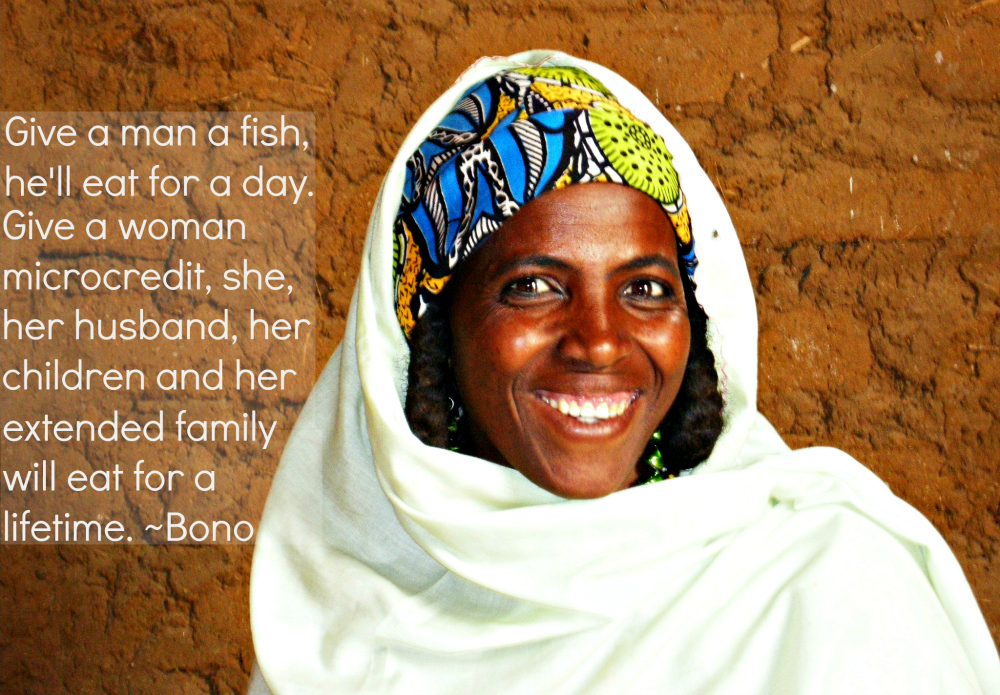 |
Visiting the Bill and Melinda Gates Foundation Visitor Center
by Laurie Reemeyer
A few weeks ago, I had the opportunity to visit the Bill and Melinda Gates Foundation Visitor Center in Seattle. The center opened in February of this year, and showcases the innovative work that the foundation’s partners are doing to address difficult challenges in the developing world in health and poverty alleviation, and in the United States through education. The foundation is guided by the belief that all lives have equal value, and that every person deserves the chance to live a healthy, productive life.
The center describes the history of the foundation, and showcases studies of programs and their impact through static and interactive displays and films. It also describes the methodology through which the foundation identifies opportunities and works to solve problems. There is a strong focus on measuring impact to ensure that funds are being invested effectively to solve significant problems.

One of the displays at the center is focused on the burden of carrying water in Africa. Visitors can feel how heavy a bucket of water is, and a series of footprints help demonstrate the lengths many women and children have to take each day for water. Wells Bring Hope is raising awareness and funds to tackle this exact problem in Niger.
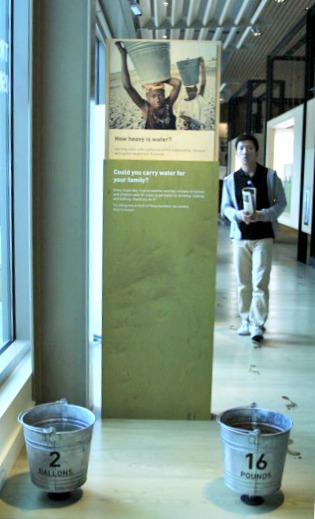 |
The center has a number of interactive displays where visitors can contribute ideas or evaluate their skills and preferences for working on a cause. There is also a Cause Board, where visitors are invited to share a cause that they support. I took the opportunity, as a donor and volunteer for Wells Bring Hope, to promote our organization.
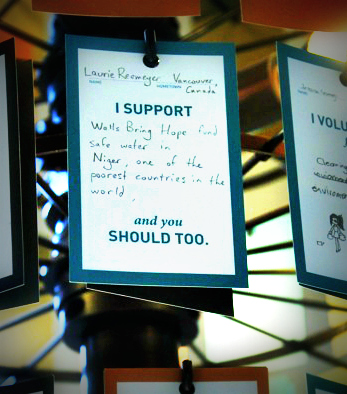 |
If you are visiting Seattle, I highly recommend a visit to the center. It really made me think about some of the major challenges in the world and the important part we are we are all playing the solutions.
Service is Joy

Wells Bring Hope volunteer Ida Harding, pictured above, knows a thing or two about service. She is a long-time member of our organization and has twice made the difficult journey to Niger. Ida volunteered to be the second camera person just prior to her first trip and got a “crash course” in videography. She is responsible for many frames of footage obtained on both trips. Ida’s on-going support has been invaluable and, as you can see above, her radiance and fun-loving spirit is a joy to behold. You can read about her experiences in her own words on her Water Circle page.
A Model of Hope and Perseverance from Niger
by Kate Cusimano
Dominated by the vast expanse of the Sahara, Niger, the second poorest country in the world, is 80% desert. It is also landlocked, plagued by near-constant drought, and at the epicenter of the world water crisis. 68% of Nigeriens lack access to clean water, 87% lack adequate sanitation, fewer than 30% of adults are literate. There is not a single rowboat or scull in the entire country. Basically, it is the last place on earth that you would expect to produce a hero of Olympic rowing. Yet this week, one of the biggest stories to come out of the Games in London is that of Hamadou Dijbo Issaka, a gardener from Niamey, the capital of Niger, who is competing in the Olympics as the sole member of his nation’s rowing team.
Now, to be clear, Hamadou has not actually won any races in London. In fact he has finished dead last in each of the three races he completed this week. What he lacks in athletic prowess, however, he more than makes up for in heart, and that fact has won him fans around the world. Each time he crosses the finish line, visibly fatigued and slumping over his oars, it is to the crushing applause of a packed grandstand, everyone standing to cheer him on. In his first Olympic race, even the announcer joined in – shouting, “You can do it,” as Hamadou pulled across the finish line nine minutes behind the winner and close to two minutes after his closest competitor.
To call Hamadou an underdog is a gross understatement. That he made it to the Olympics at all is almost unfathomable. Four months ago, the father of two had never even been in a boat, had watched rowing only on television. Due to Niger’s lack of resources, much of his training was completed in a traditional fishing boat. When Hamadou first stepped foot in a scull during a two-week training period in Egypt, he fell overboard, a fact that would embarrass many would-be Olympians. Hamadou, however, recounts the story with a smile saying, “…it was lucky I can swim.”
Hamadou’s perseverance even when the deck was stacked against him is representative of the spirit of his countrymen, a people who are familiar with carrying on in the face of the seemingly insurmountable odds of famine, drought, locusts, and crushing poverty. Hamadou freely admits that he lacks skill and experience but insists that, “It’s all about courage.”
|
|
Despite his poor performance in London and his age, at 35 Hamadou is at least a decade older than most of his opponents, he is determined to keep training and to return to the Olympics despite the obstacles. Proper rowboats have been ordered and are scheduled to arrive in late August. “At the moment we don’t have any boats, but maybe…Inshallah [God willing]…we might.”
Sources:
Witnessing Famine Relief in Niger, West Africa
by Barbara Goldberg
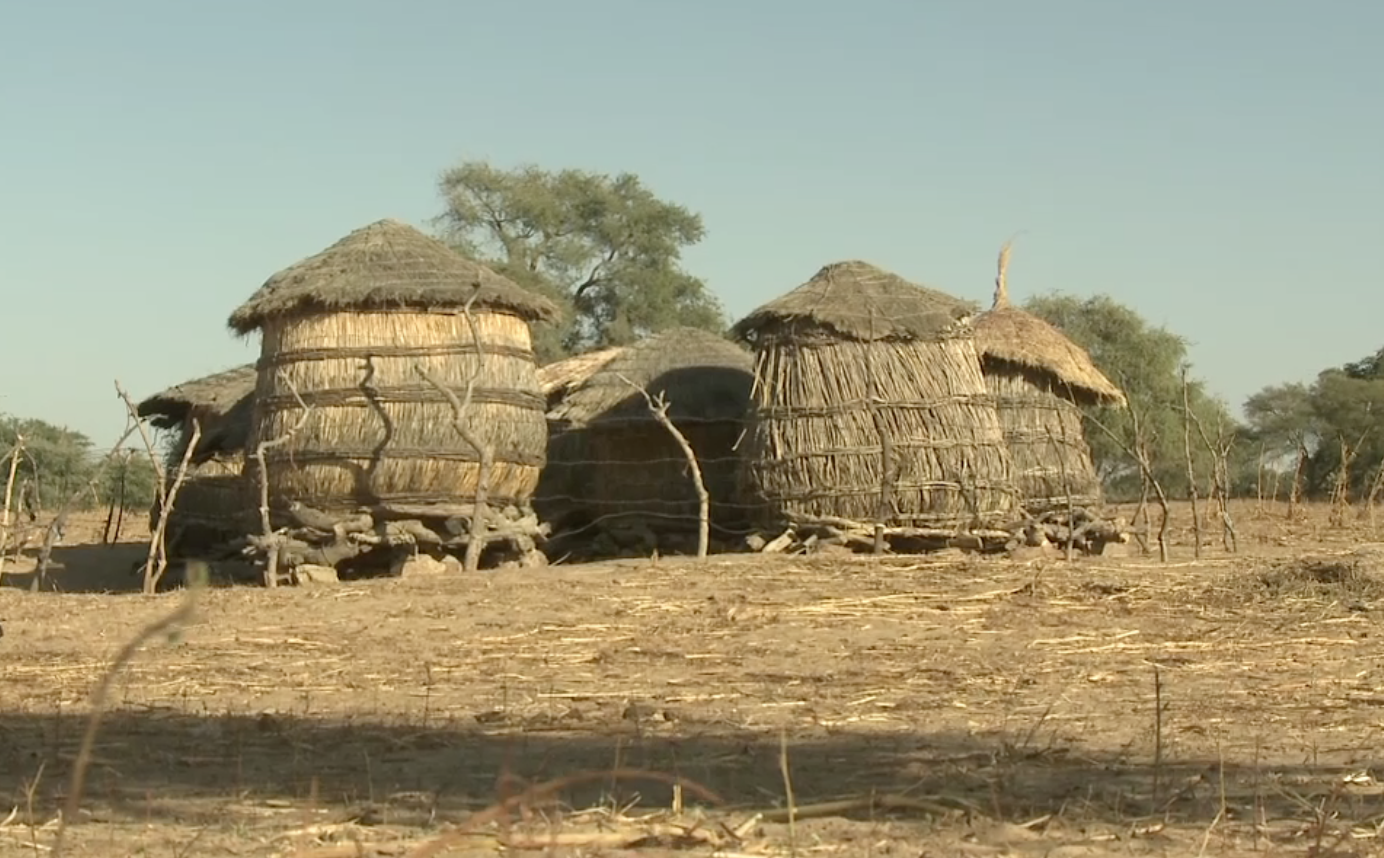 |
| {grain storage with rapidly dwindling reserves} |
When we visited Niger in January 2012, we saw the beginning of the famine that was coming to wreak havoc on the Sahel, West Africa. As we drove into the village of Miyaki where we had drilled a well three years earlier, we saw mothers lined up to have their children evaluated for malnutrition and to receive food supplements that our partner, World Vision, was distributing. Wells Bring Hope is very proud of the work that we do to deliver safe water to some of the poorest people in the world; we are equally proud to be affiliated with a humanitarian organization like World Vision that is doing so much to alleviate the food crisis in West Africa.
As we saw the suffering of the women and children at the clinic, it was heart-breaking to know that the worst was yet to come. It was even more devastating to know that many in other parts of the country will receive no food supplements, will have no access to help at all. Remember, this is the second poorest country in the world, with a government equally as poor.
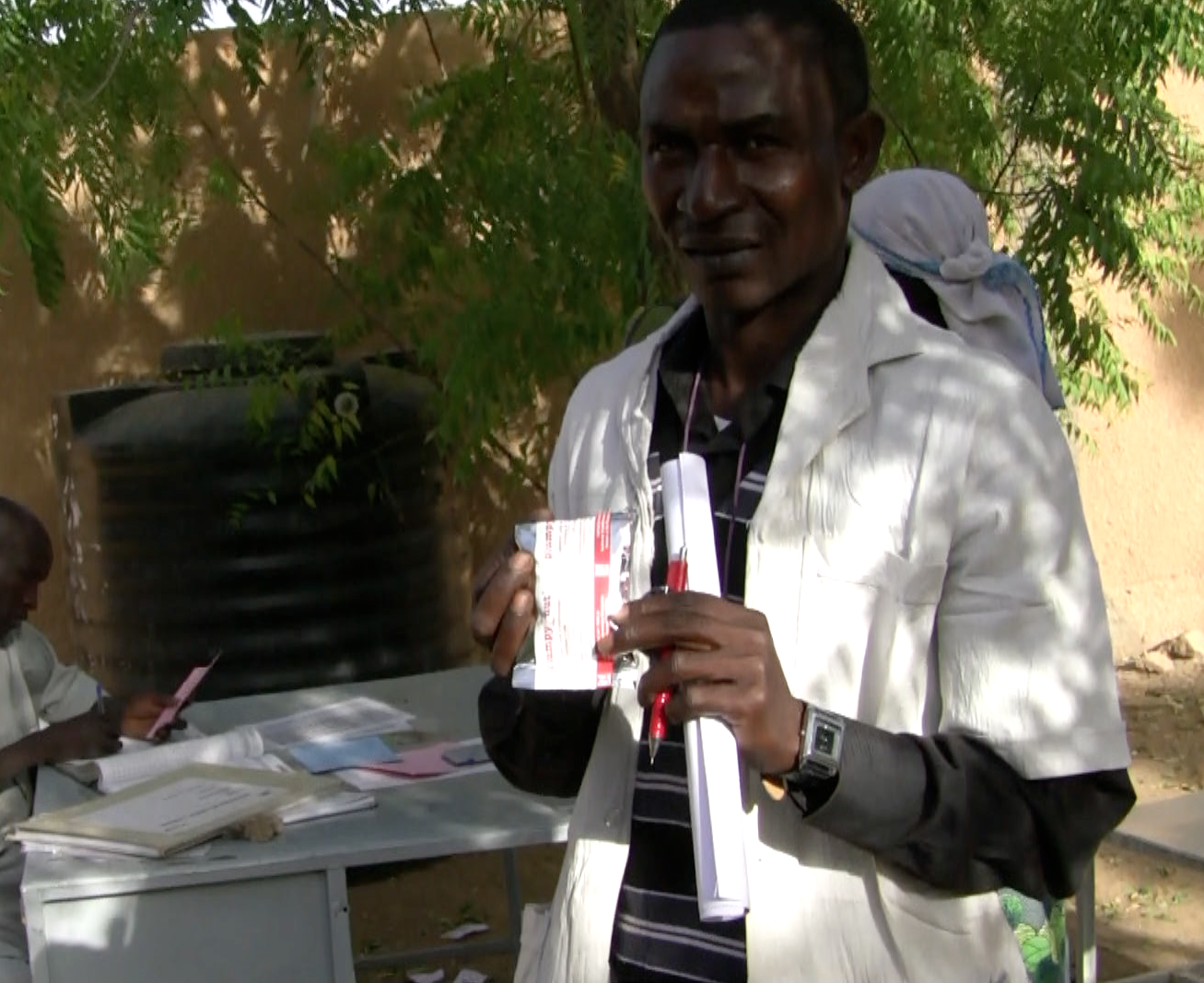 |
| {a nurse preparing to treat malnourished children} |
The famine is the outcome of the most severe drought Niger has suffered in many, many years, and droughts have become increasingly frequent. The rainy season started in late June and we can only hope that it will last a long time and enable crops to grow, providing food for the people.
As of mid-June, feeding centers across the country have admitted and treated 130,596 children under the age of 5 for Severe Acute Malnutrition (SAM) and close to 200,000 have received treatment for Moderate Acute Malnutrition (MAM). (See video link below to view children being evaluated and categorized.)
 |
Despite the fact that, since April, each day an average of 1,000 new cases of SAM are admitted for treatment, the system is coping with the increased workload, which, overall, remains below the levels recorded during the 2010 crisis.
This is likely due to the massive treatment of MAM cases, averaging over 10,000 per week, as well as to the early response measures to contain food insecurity and malnutrition, put in place in November 2011.
Watch the video filmed, edited and narrated by Daniel Yadlosky of our experience in the village of Miyaki and see famine relief in action.
Water is Fundamental
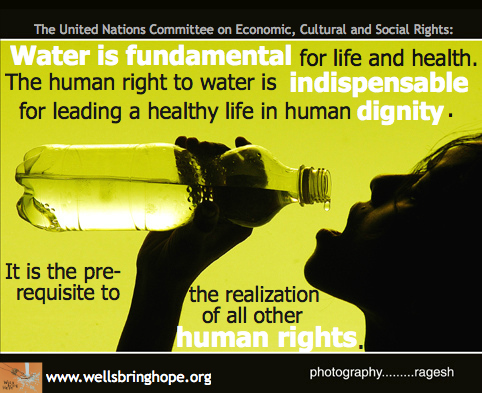 |
Water for the World
by Lauren Adamson
If passed by Congress, the Water for the World Act will help bring safe water and sanitation to millions of people who suffer a lack of access to clean, safe drinking water, which in turn leads to disease, malnourishment, and often death. Sub-Saharan Africa is particularly plagued by this lack of safe water, and while Wells Bring Hope has drilled 171 wells in Niger, the WASH (water, sanitation, and hygiene) crisis continues in developing countries worldwide. The Senate Foreign Relations Committee took an important first step toward ending this crisis by voting unanimously in favor of Water for the World Act on June 19. If Congress as a whole passes the bill, it would initiate the process of providing 100 million people with safe water and sanitation (usually in the form of toilets or latrine).
Safe water is not a partisan issue; it is a human rights issue, which is why the Water for the World Act is one of the rare acts with bipartisan support. In addition to being being a moral imperative, providing for safe water and sanitation in the developing world is sound economic policy as well. Every $1 spent on WASH yields an $8 return in saved health costs and increased productivity. Nevertheless, the Water for the World Act needs national attention and support from the House of Representatives before it can begin to have a transformative effect on millions around the world.
As we often mention here at Wells Bring Hope, safe drinking water completely transforms the lives of the people who obtain it for the first time. In Niger and other impoverished countries, clean water especially benefits women and girls. When a well is drilled in a rural community, women and their daughters no longer face the hazardous, grueling task of walking miles for water that often makes them and their families ill, despite their efforts. A well allows girls to go to school (often for the first time) and provides their mothers with extra time to generate an income using the microloans Wells Bring Hope provides. We hope to see The Water for the World Act passed soon so that 100 million people can have the basic need for safe water met. Having access to safe, clean water is something the developed world rarely thinks about, because it is so readily available here. It is important to remember that there are still over 800 million people without access to safe drinking water.
Read more about The Water for the World Act here.
To voice your support for the act, you can go here to contact your senators and representatives.
Niger’s hunger crisis could lead to more child marriages
The Washington Post published a chilling story on July 9 about how the famine in West Africa could lead to even more child marriages in Niger, which already has the world's highest rate of child marriage.
According to the article, in Niger:
“Roughly one out of two girls marry before age 15, some as young as 7. As a hunger crisis affects millions here and across the Sahel region of West Africa, aid workers are concerned that struggling parents might marry off their daughters even earlier for the dowries they fetch, including animals and cash, to help the families survive.
'The fear is, if the food crisis continues, that more parents will use marriage as a survival strategy and that we’ll see more girls married before the age of 15,' said Djanabou Mahonde, the head of child protection at UNICEF.”
Additionally, marrying at a young age means girls become mothers sooner, which brings its own set of health issues. The Post article notes that Niger has high rates of obstetric fistula, a medical complication that often affects girls and “usually develops when an unborn baby gets stuck in the pelvis, cutting off blood circulation and leading to rotting of tissue.”
One of the root causes of the famine is the lack of clean water, and Wells Bring Hope is doing its part to alleviate the problem. Remember, when a water well is drilled, it results in girls getting an education, which in turn leads to delayed marriage and child birth — and better overall health outcomes.
Wordy Wednesday
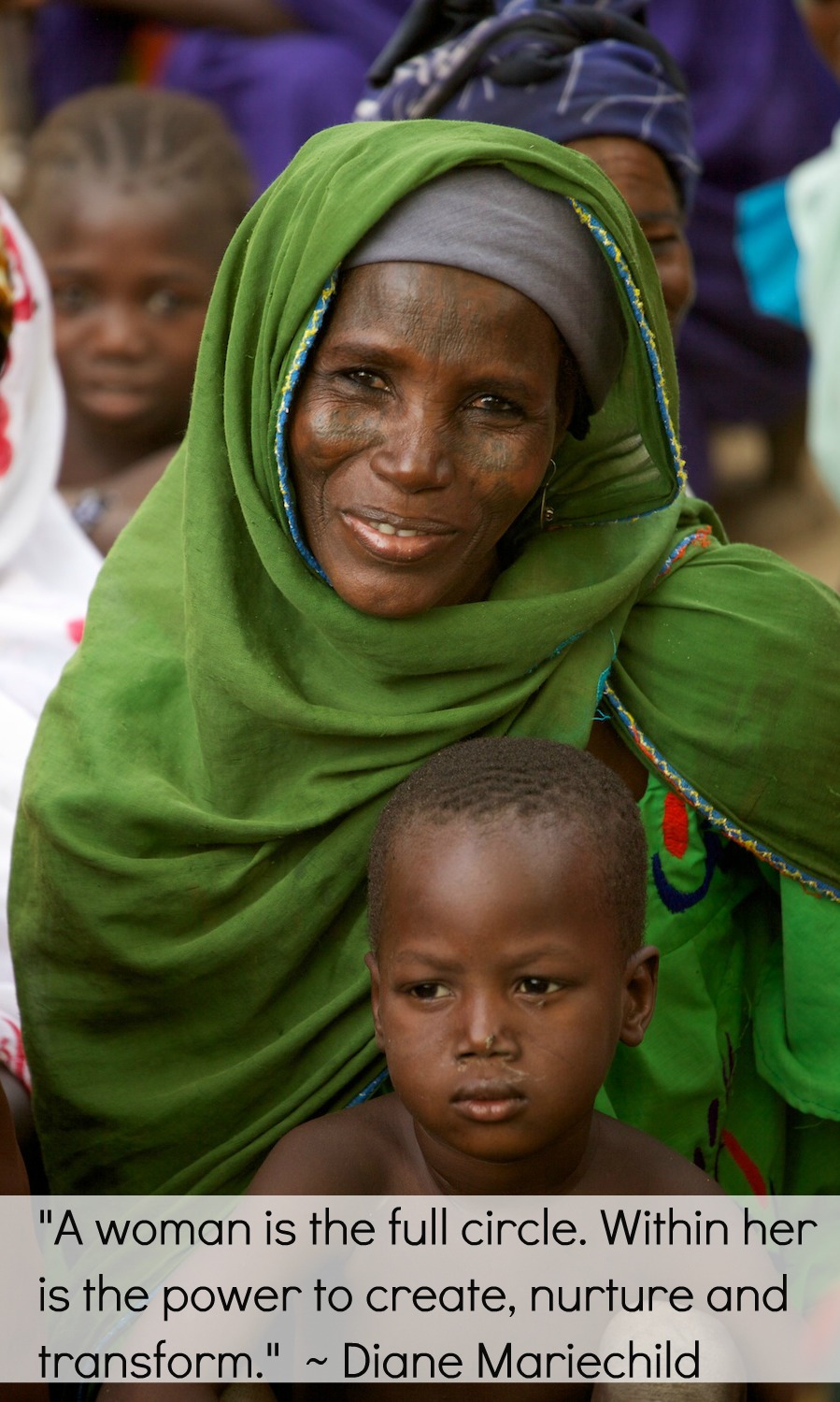 |
Los Angeles Senior High School Holds Successful Water Walk
By Dennis Ojogho
Dennis Ojogho is a former student at Los Angeles Senior High School. He is headed to Harvard University in the fall.
Despite very limited time to plan, Los Angeles Senior High School managed to have 53 students participate in its water walk on April 12. In order to understand what women in Africa must endure on a daily basis—trekking long distances to gather clean water—I brought four 80-pound cans of water for the students to take turns carrying during their one mile walk around the campus track at lunchtime.
I founded a Wells Bring Hope Water Circle on campus to raise funds to drill a well in Niger. So far we’ve raised nearly $1,000. The water walk was a perfect opportunity to bring awareness to the dire need for water in many countries around the world.
As we walked, I spoke about the situation in Niger and explained what we could do to help the people there. Organizing this walk was the most fulfilling experience of my life. To see teenagers, who are stereotyped as apathetic and selfish, going out of their way to support such a cause was truly heartwarming.
There is no better feeling in the world than to know that you have used your voice to speak for those whose voices aren’t always heard.



